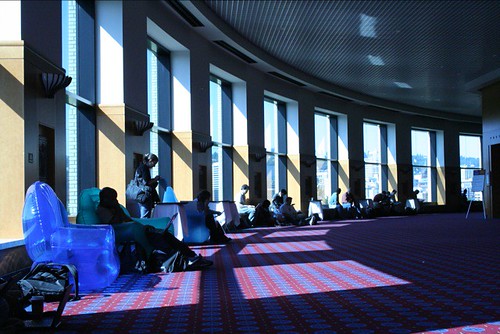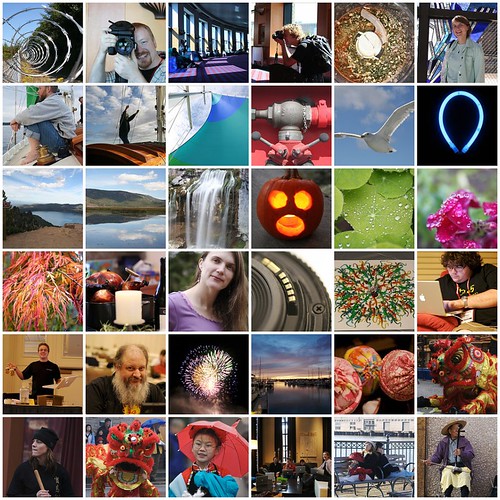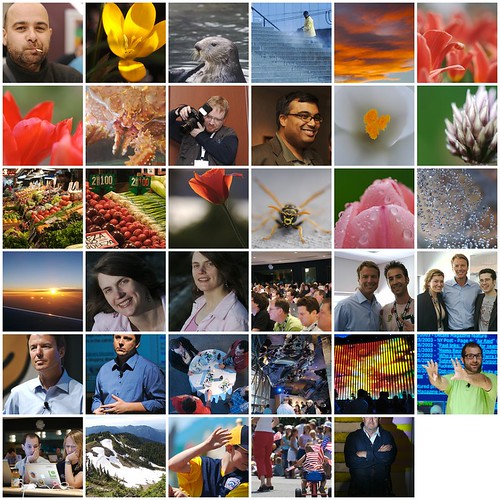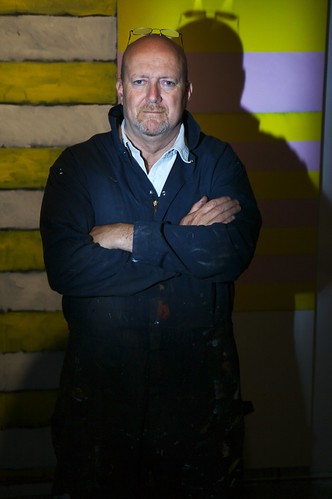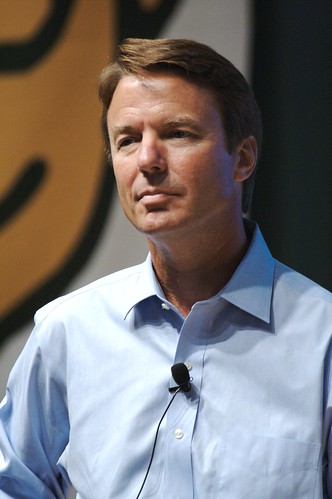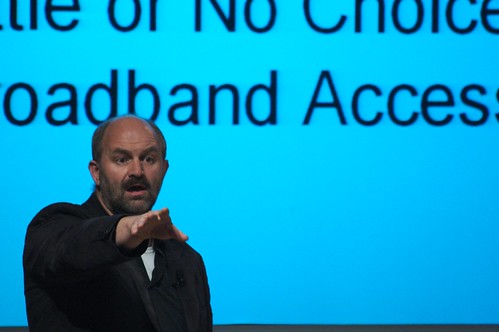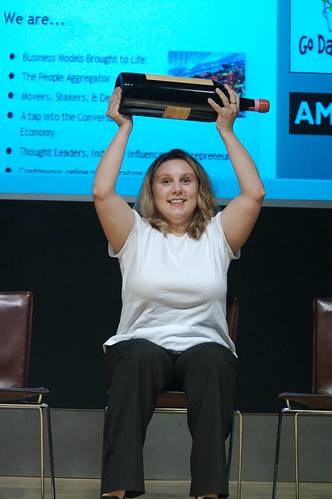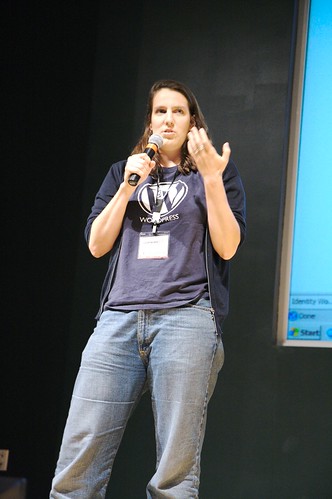Ted Leung on the air: Open Source, Java, Python, and ...
It's becoming increasingly hard for me to do a decent job of blogging conferences in anything approaching real time. The face to face time is so rare and precious that it's hard to justify dropping hours of sleep to do the analysis and posting, especially when I am already dropping hours of sleep just to keep up with the face time.
Instead of going to the tutorial track, this year I once again attended a meeting for people working with the non-technical end of open source foundations. I haven't been able to get to every meeting (some are in Europe), but I've found the gatherings to be very informal. Last year, I learned an enormous amount about what is happening in the Eclipse community, and I think that it's worthwhile for open source people to be aware of the things that are happening at Eclipse, particularly if your community is going to interact with companies.
This year there were a pair of topics that stood out to me. Zak Greant of the Mozilla foundation discussed how he is using a bug/issue tracker to deal with community issues. This sounds like a no brainer kind of activity, particularly for open source projects, but I am not aware of any other community that is making use of this practice. I think that Zak is going to put up some documentation on what he has been doing, and I plan to link that when it goes up.
The second topic was kind of a side discussion on the topic of how to explain open source software to non computer people. Two of the phrases or labels that caught my attention were "green" software and "organic" software (as in organic food). I don't know whether these are the right labels for the job, but the whole notion of applying food labelling to software and technology issues is an interesting one.
The OSCON program looked much stronger to me this year. There were several slots where I had to make tough choices about which talks to attend. Also, this year there was a much larger number of talks on community building and other soft topics (not including business topics, of which there have been many over the years). While writing up this summary I realized that the only technical talk that I attended this year was the presentation that some OSAF'ers gave on Cosmo and Scooby, our web projects. This happened partly because I inserted a few "hallway track" sessions. But it happened mostly because I prioritized community/soft talks over technical ones. OSCON is a conference about open source. The whole point is that any "outsider" ought to be able to go to a project's web site and get up to speed by looking over the documentation and other materials that are available. If that can't happen, then either the "outsider" can't read, or the "insiders" can't write. So while it would be nice to sit in a session to get the scoop on a topic, I ought to be able to find that information on line somewhere. My view of open source, heavily influenced by my participation at Apache, is focused on the community aspects, not the licensing or technical aspects. The community building part is the hardest part of open source and plays a huge role in determining whether projects are successful over the long term. More than anything else, I think that these topics are the "secret sauce" of open source.
The best talk of the entire conference was Brian Fitzpatrick and Ben Collins-Sussman's talk How Open Source Projects Survive Poisonous People (And You Can Too). This was a hugely practical talk on dealing with difficult people. Part of the reason that their talk was so practical is their opinion that a strong community is the best defense when dealing with difficult people. So not only did they discuss difficult people, they also discussed what a healthy community looks like. Fitz and Ben are developers on the Subversion project -- Fitz is also an a Apache guy -- as is Karl Fogel, author of Producing Open Source Software. I think that the Subversion team's work in helping people understand community building is growing to be (at least) as significant as the work that they are doing by producing Subversion itself. I hope that Fitz and Ben will be posting their slides soon.
Other talks that I really liked: Jeff Waugh's talk on the Ubuntu community. It was a tough choice to go to this talk because it was opposite the panel "The Art of Community" which had some friends on it. For some reason that I can't explain, I had not really looked carefully at the governance and community organization of Ubuntu. The problem is now rectified, but I wish that I had paid attention sooner (kind of like Eclipse). Jeff started by talking about shared vision and shared values. I think that it is somewhat common for open source projects to have some kind of (codified, even) shared vision. It seems to be less common that they have explicitly thrashed out what the shared values of the community are. That lack of values is one of the sources of tension in communities. I am very interested in a lot of the things that the Ubuntu folks have done.
r0ml was all over the place at OSCON -- I think that he gave 3 presentations, including a keynote. Having sat through the first two parts of his "The Semasiology of Open Source", it was "inconceivable" that I would miss the final portion. As always with r0ml, the presentation skill and style is as much the draw as the content -- look for the audio when it hits IT Conversations.
Karl Fogel gave a great session on tools for facilitating open source communities. I am definitely an admirer of Karl's work, and it was great to meet him in person after the session and tell him a bit about the impact that his book is having amongst people that I know. One of the things that I have been thinking about is the need for better tools to facilitate the entire open source process, and Karl has been doing some good thinking about this, which he shared in his talk. I hope that he will be posting his slides or some other kind of write up soon.
I've already gone on record as being "not a fan" of the 15 minute keynote format. I'll make an exception for r0ml's 15 minutes of presentational virtuousity. However, the other two keynotes that got my attention were longer than 15 minutes. Damien Conway did a wonderfully entertaining keynote lampooning various product oriented keynotes. I can only assume that his keynote was inspired when something inside of him snapped. This keynote will not translate well to podcast, since you'll miss some of the accompanying video cues. I hope that somehow the full video winds up on the web. Eben Moglen delivered a speech that epitomizes what I think a keynote should be. He started by taking on Tim O'Reilly's question "Do licenses matter?" and showed why in this day of "open source triumph", licenses still do matter, why the desktop and pant's pocket are still important, and called upon the open source community to do their part in answering the question "do users have rights?".
Last year's OSCON was the first conference that I attended with a camera, and a photo that I took accidentally (I messed up the white balance setting)
accidentally (I didn't consciously enter - all you had to do was tag photo's the "right way") made the final group of the HP sponsored photo contest.
This year I actually paid attention to the directions and consciously entered some photos. I was very happy when one of my photos was selected as one of the grand prize winners:
My thanks to the gentleman that allowed me to take this picture (I asked before I took the shot). You can see the other prize winners here, and you can see all the photos that were entered here. There were lots of good photos taken for the contest, and I am happy that my skills with a camera are improving.

My Flickr set for OSCON is now up. I'm starting it off with shots from last nights photo walkabout.

I spent yesterday at the first day of the Internet Open Space in Vancouver. Vancouver is just close enough to drive it -- three hours each way. I ended up staying in a cheap hotel on Wednesday night so that I would be good for something on Thursday. Once upon a time, I could drive five hours (almost) straight with no problem. Nowadays, I spend such a small amount of time in a car, which has led to a lack of driving endurance.
I've been following the identity space with varying degrees of closeness for a few years now. The open space was a good opportunity to get caught up on the state of the world. I was pretty interested in the Liberty Alliance when it was announced a few years ago. The ASF was listed as a participant, but for reasons which remain a mystery to me, nothing ever actually happened. In the meantime, there has been a small explosion of protocols to deal with single sign on for web applications. There appears to be some coalescing of that work around Yadis and OpenID. Other vendors like SXIP and Microsoft round out the space of identity protocols.
The first session that I went to covered efforts to produce open source implementations of the Liberty specs. Apparently these efforts are just getting underway -- ironic given where things could have been. Nonetheless, a good step. I was pleased to hear about the Lasso C library for Liberty -- this is important for scripting languages. Unfortunately, I'm less excited about the GPL license, which is going to make it hard to use in some of the settings that I am interested in.
David Recordon did an informative session on OpenID 2. OpenID is expanding its scope from authentication into other areas, most notably data transfer / profile exchange. I missed most of Drummond Reed's session on Yadis -- I just caught the end, which was mostly about XRI -- but there was enough discussed in David's session that I have a general feel for what is going on. I was also glad for the chance to meet David and Drummond (for the second time), since I'll be working with them on Heraldry. Meeting people at events like ApacheCon and PyCon has demonstrated that a little face to face contact can go a long way towards easing interactions via e-mail and other mediums.
During and after lunch, I attended a mega session. Dick Hardt's session on protocol convergence and Marc Canter's session on NoID4Me ended up merging. The theme of both sessions really focused on obstacles to adoption. Marc was pretty vocal about the needs that he has for PeopleAggregator, which drove a good portion of the discussion. There's general agreement about the need for convergece of protocols, but of course, each protocol team has a vested interest in their own, and feels that theirs is the protocol that should be converged to. Someone suggested that the various protocol developers take a month off from working on protocol stuff (a deployment sabbatical, Kaliya called it), and go help someone try to implement/deploy their protocol in a product setting. I think that this is a pretty good idea if people aren't doing things like this already. One other potentially positive development from this discussion was the start of a conversation on how to have SAML and OpenID work together. The likely areas seemed to be around authentication, and the use of parts of SAML for the profile exchange mechanism that's being considered for OpenID.
When I saw Kaliya Hamlin at Gnomedex, she told me about the Liberty People Service. This is the kind of thing that would be very useful to integrate into Chandler, so I made sure to attend Paul Madsen's session on the People Service. The session was dominated by technical content as people tried to understand how the service actually worked. Despite being unfamiliar with most of the Liberty specs, I found that I had no trouble following the discussion. I spent a year or so doing some consulting on the WS-* web services stack, and that experience made it possible to follow along. I had also read the People Service whitepaper. which probably also helped. I was disappointed to hear that there are no implementations (other than private prototypes) of the People Service that someone could get a hold of and play with. In this day and age, I expect a spec to be accompanied by a reference implementation or something. Maybe I've just been hanging out with the wrong people.
The last session that I went to was Mary Ruddy's session on Higgins, which is "bus" which allows you to plug in identity protocols/stacks and provides an API for use by a diversity of clients: web browsers (via extensions), web services (via SOAP), and rich clients. There is a reference implementation that is written in Java, and seemed kind of oriented towards InfoCards. Mary said that someone was working on a C client, but she wasn't able to say much about that. I hope there will be news soon, since I am interested in either Python or Ruby implementations.
In the evening there was a nice dinner at a Chinese restaraunt. I had to skip out just a bit early, since I was driving home. Good thing too. I ran into night time highway construction on I-5 that caused me to miss my intended ferry. On the whole though, a worth while experience. I've been interested in getting support for identity into Chandler when the moment was right. It's my personal belief that People are a key way of organizing and relating to information. When I worked at Taligent, I almost worked on the workspace team, which was the team working on CommonPoint's equivalent of the Finder. The user metaphor for the workspace was called "People, Places, and Things". I wasn't there for the design discussions, but I don't think the order of the words is an accident. Bryan Starbuck and the Windows Contacts team are thinking some of the same thoughts that I am - not completely the same, obviously, since they have different problems.
It was good to see what else was happening in the same space of things as Heraldry. I was struck by how different the culture is between Liberty and the "user-centric" (I finally understand where that label came from -- and it's not obvious -- another problem that needs to be fixed in order to help people figure out what is really going on here) camps. Because Liberty is a pay for membership organization, there was often that "Liberty member" only situation. The last time I dealt with this was when I was dealing with the W3C and JCP. I didn't like it then, and I don't like it now. The Liberty stuff is well engineered, and very enterprise oriented - the design dials were turned towards maximum security, a decision which I can understand and appreciate. As I listened throughout the day, it struck me that I was re-living the J2EE vs non-J2EE/Ruby on Rails conversation. J2EE is an enterprise strength stack and there are some organizations that really need all the features and specs that go with J2EE. I think that these are the same organizations that need (and helped start) Liberty.
Other observations: I picked up one or two practices from Kaliya's facilitation of the open space, and maybe we'll try them at the next Mind Camp. There were very few cameras around, which made me somewhat self conscious about taking a lot of photographs. But I did take some, and the set is up on Flickr, including shots of some of the flipcharts.
If you were interested in something that I didn't attend, notes from many of the sessions are up on the IOSVan wiki.

Chris at the DSLRBlog is celebrating his first year of photography, which happens to be right around the same time as mine. In the spirit of celebration, here are two montages of my favorite shots from my first year.
1. A visit to Collocation, 2. OSCON 2005: Going Head to Head with James Duncan, 3. OSCON 2005: Outside the keynotes, 4. OSCON 2005: Ben Hammersley, 5. The entire rub, 6. Julie, 7. Don't make me go home..., 8. The joy of sailing, 9. It really is a beautiful sail, 10. Untitled, 11. Untitled, 12. More photographic experiments, 13. Paulina peak, 14. Paulina Lake, 15. Paulina Creek Falls, 16. Untitled, 17. Untitled, 18. Untitled, 19. Untitled, 20. Thanksgiving, 21. Julie - Headshot 1, 22. Backside of a "Nifty 50", 23. Seattle Mind Camp, 24. Paul Querna, 25. Leo Simons, 26. Ken Coar, 27. Untitled, 28. Untitled, 29. Untitled, 30. Lion Dance, 31. Lion Dance, 32. Lion Dance, 33. Street Parade, 34. What's wrong with this picture?, 35. The waterfront, 36. Chinatown
1. Andi, 2. Crocus, 3. Untitled, 4. Northern Voice, 5. Today's sunset, 6. Tulips, 7. Tulips, 8. Alaskan King Crab, 9. Obligatory James Duncan shot, 10. Rohit Khare, 11. Crocus, 12. Untitled, 13. Pike Place Market, 14. Pike Place Market, 15. Untitled, 16. Untitled, 17. Tulip, 18. Untitled, 19. Sunset on the flight home, 20. Strobist Boot Camp Assignment #1 - Headshot, 21. Outtake - Strobist Boot Camp Assignment #1 - Headshot, 22. Gnomedex 6.0: Day 1, 23. Gnomedex 6.0: Day 1, 24. Gnomedex 6.0: Day 1, 25. Gnomedex 6.0: Day 1, 26. Gnomedex 6.0: Day 1, 27. Gnomedex 6.0 Pre-Party, 28. Gnomedex 6.0: Day 2 - Experience Music Project Party, 29. Gnomedex 6.0: Day 2 - Experience Music Project Party, 30. Gnomedex 6.0: Day 2, 31. Gnomedex 6.0: Day 2, 32. Hurricane Hill Trail, 33. Bainbridge Island Fourth of July Parade, 34. Bainbridge Island Fourth of July Parade, 35. Strobist Boot Camp Assignment #2 - Background
Montages courtesy of fd's Flickr toys.

This was my entry for the second Strobist Bootcamp assignment. It was a lot of fun to shoot this one. Paul, the model, is a painter, and we had fun experimenting with various ideas during the shoot. I am really getting a huge amount out of the bootcamp.

On Thursday, I'll be attending the first day of the Vancouver Identity Open Space. I'm looking forward to this, especially after the acceptance of Heraldry.
The following week I will be in Portland for OSCON. In addition to the normal OSCON festivities, James Duncan Davidson is organizing a photo walkabout on Sunday if you are getting in that early (I will be).
If you're at either event, come by and say "Hi".

I am going to be one of the mentors of the Heraldry project that has been accepted for incubation at Apache. The initial goals for Heraldry are:
- Expansion of Yadis and OpenID libraries into additional languages beyond the existing Python, Ruby, Perl, and PHP libraries
- OpenID authentication specification revision to fix known security considerations, investigate compatibility with the DIX IETF proposal, describe Yadis integration, and allow either an URL or XRI be used as the End User’s Identifier
- Continue the development of a data transfer protocol on top of OpenID to allow the exchange of profile data as well as other secure messages
- Investigate existing mechanisms for profile exchange, namely Sxip 2.0 and SAML, and investigate how they would be layered atop OpenID
- Integration of the OpenID Authentication protocol with the Higgins framework to provide desktop integration
- Extension of OpenID to support non-browser based authentication use cases. ie authentication to a Subversion server, creation of mod_authnz_openid, using your OpenID Identity without modifying the svn client-side tool
I've been interested in the digital identity space for some time, and I''m looking forward to getting more directly involved. I hope that some of you will too, this is an important area.

[via Hack the Planet Innovation Happens Elsewhere ]:
Ron Goldman & Richard P. Gabriel posted Innovation Happens Elsewhere, their book about corporate participation in open source projects.

When Chris and Ponzi asked if I would take photographs of Gnomedex for them, I had about the same reaction that as if someone asked me to photograph their wedding: "Are you sure"?! Doing a good job of photographing a conference is hard work, and having watched my friend James Duncan Davidson do it, I know how much work it is, and the level of pictures that someone like James is producing. In the end, they assured me that they were not looking for "O'Reilly quality" photographs, and I promised them that I would do my best. Here's my Flickr set for Gnomedex 6.0, which contains (what I think) are the best of the photographs that I took.
It's a very different experience to be just running around a conference with a camera, and being on the hook to try and really record what is going on. You don't want to miss anything, and you want to make sure that the photos that you take don't portray people in an unflattering light. Practically, this means lots of running around and moving round the room to try to get different angles and magnifications of people. During the course of the pre-party and the two days of Gnomedex, I shot a total of 1578 frames, and by the end of the show, I was totally pooped out. It turns out that camera equipment is heavy if it is in your hand all day.
Of course, there are also benefits. If you are walking around with a "big camera", along with an external flash, and a monopod, people are very accomodating. Lots of people stopped to let me get a shot, I leaned over many desks, stood on chairs and countertops, and no one said a word. I also got access to some things that other people didn't like private photo ops with John Edwards in the green room.
There was also a fun community thing that happened. It turned out that one of the best places to shoot was right down in front, in the aisle. That spot turned into a little hangout for the photo crazies at Gnomedex. Scott Beale, who I finally met in person, wisely set up his base camp right in the front row, so he had a seat and full access to his computer. Kris Krug was down there often, although sometimes it felt lik he was spending more time shooting me than shooting the stage. Dan Farber also came down quite a number of times to grab some shots.
A couple of anecdotes from the photographer's view. When Edwards came out on stage, there was a huge burst of flashes. The burst was very visible from where I was in the front row. After that died down, people in the front row were probably deafened by the sound of Scott, Kris, me, and the official Seattle PI photographer. It was click, click, click, click. It was pretty funny.
Ironically, the most likely to be remembered shot was not taken by Kris, Scott, or me. When Chris went into his Michael Jackson routine, all of us were using fairly long lenses, and focusing in just on Chris. I don't know about Scott or Kris, but I couldn't see the "Think Small" text on the screen behind Chris. But Josh Bancroft saw it, and he got the shot and piped it up via his EVDO connection. Just goes to show that it's not the equipement that makes the shot. I'd guess that Josh is pretty glad that he "caved" and got a new camera.
For Speakers
James has already written a great essay giving speakers tips on being photographed well. I would add a few more things.
- Move away from the podium - being stuck behind the podium seriously reduces the number of decent looking angles that a photographer can use.
- Don't move too fast - conferences are held in dark rooms, and the cameras stretched really far.
- Take your hands out of your pockets - It is really hard to make you look good when your hands are in your pockets.
At Gnomedex there were a few speakers who were just exceptionally easy to photograph. For those speakers, I had lots of great shots - it made it hard to pick just one. For speakers at the other end, even though I shot many pictures, it was really hard to get even one shot that was flattering.
For photo geeks
When you shoot 1500 frames, post-processing and flickring them become an issue. I ripped out an enormous number of shots -- I shot an entire 1GB card (110 RAW frames) of John Edwards alone. I think that there is something that needs to improve in my technique, because I've watched James and he clicks a lot, but I don't think he's clicking as much as I am. Seems like I am using brute force to solve the problem here. Everything about this experience has given me even more respect for James than I already had.
As far as post processing goes, Aperture got the nod, and did admirably. I am pretty sure that there are still a few ways that I can streamline my workflow, but I was mostly happy. The only source of unhappiness has to do with the way that versions and ratings interact. I created an new Aperture project with sub albums for each day of Gnomedex (if there's a next time, parties get their own albums too). Then I used ratings to help me get to the set of pictures that I was going to post. The problem is that sometimes there were pictures that needed an adjustment before I could tell whether they'd move to the next level. I discovered that when you create a new version, the ratings aren't coupled between the versions, at least when you are working in an album. In any case, this needs some serious manual reading to get to the bottom of it.
I've been using the Yahoo/Flickr uploader since I switched to Aperture. Oh how I miss Fraser Speir's IPhoto Flickr Export! One night I had the Flickr uploader crashing all over the place on me. I think it has something to do with the program not being native for Intel, or the PPC emulator getting confused. It caused major pain. Here are some features that the ideal uploader would have:
- Be Universal
- Be fast
- Allow me to arrange the pictures into the order they will appear, even if I add new pictures (before I upload the batch)
- Setting the title and description and licensing as a batch operation
- Description "footers' so you could do things like "Attribute to Ted Leung"
- Let me navigate with a keyboard
- Complete tags using my tag set from flickr
- Upload on a schedule and in batches. A few people that I talked to just hooked their cameras up and uploaded the entire contents of their memory cards, which buries everyone who came before. I'd like to see a way for me to upload a big batch in smaller chunks and spread out over a period of time -- but I want to set that all up at once and then walk away from the computer
Thanks again to Chris and Ponzi for the opportunity to do this. I'm glad to see that people are using the shots.

This year Chris and Ponzi asked me to shoot some pictures during Gnomedex 6.0, so I spent a lot of Gnomedex running around with a camera in my hand. This post is the usual roundup of impressions of the conference. I'm going to write a second post about the photography experience.
The appearance of John Edwards was one of the big deals of the show, hitting the front page of the Seattle Post Intelligencer over the weekend.
Senator Edwards
Lots of people seemed focused on whether or not Edwards was "their" candidate or not, and on whether or not he got it. Edwards got lots of props for admitting that it was very hard for him (and other politicians) to break out of the guarded facade that has been the standard for politicians for many years. I think that the public also has to break out of its old way of relating to and viewing politicians. Before Edwards arrived, Chris Pirillo pled with the audience to use this as an appearance as an opportunity to help Edwards learn about "us", the technology world and so forth. I was struck by how a conference full of bloggers slipped right into treating Edwards as a political expert and peppering him with questions about his positions. Since I was shooting the show for Chris, I got the chance to be in the green room with Chris, Ponzi, and Edwards both before and after Edwards went on stage. Afterwards, Chris was apologizing to Edwards because the discussion ended up being much more political and less of the educating that Chris was hoping for. Edwards turned to Chris and said "You know, you just can't stop them from asking the political questions". It seems that the public is as programmed as the politicians. Somehow we need a way to break the cycle.
Amazon CTO Werner Vogels
I found Werner Vogel's session on Network Neutrality to be very informative. It was personally useful to me to get a good summarization and overview of the state of the debate. He cited the Wikipedia entry as a good reference for those interested in tunneling deeper.
Bloglines gave Big Wine for Big Ideas
The juxtaposition of the Bloglines Big Ideas session with Steve Gillmor's Attention session was quite amusing. The winner of the Blog Ideas session was the idea that an aggregator should figure out what you are interested and help filter out the stuff that you aren't. I'd call that an attention+reputation based aggregator, but that's just me. Gillmor announced the "Attention Operating System" - the product of a venture between GestureBank and root.net. This is something I'm going to be keeping my eye on.
An interesting thing that Dave Winer said during his session was something to the effect that manufacturing companies are going to be come outsourced services to make stuff for people that have ideas. I think that this meshes very well with the themes that Eric von Hippel has been writing about in Democratizing Innovation
Kaliya Hamlin, Identity Woman
Kaliya Hamlin (Identity Woman) did a great impromptu session on the gap between the civil society (users) and the social tool building sector (developers). One of the efforts that she mentioned was the Interra project. Kaliya's profile has been rising recently and with good reason. It was good to see Dave Winer and Marc Canter vocally supporting her as the discussion leader. Gnomedex MVP indeed.
There was a much publicized confrontation between Dave Winer and Blake Ross, which seems to be on its way to a resolution. I'm happy that there was a resolution, but as I watched the incident there was one thing which really surprised me. Both Dave and Steve Gillmor chastised Blake (and the Firefox project) for being non-transparent, particularly with respect to product plans. The thing that surprised me is that both Dave and Steve are very savvy, and yet they seemed unaware that the product plans for Firefox are up on a public wiki, that the development is coordinated via public newsgroups and so forth. If people like Dave and Steve think that product plan information is secret the way that it is in proprietary software companies, then we in the open source community as a whole need to really rethink how we are communicating with users.
Chris did a session with some VC's where he pitched them on TagJag in front of all of Gnomedex. I though that this was a pretty educational session for people interested in getting a project funded. Jeff Clavier has more on what happened.
In addition to the zillion posts in the blogosphere, you can also see the notes that the indJet folks were taking with Mind Manager. So far only the day 1 notes are up.
This the first conference that I've attended using the official unconference format (Gnomedex used the regular speaker format last year). Werner Vogels wrote:
Beyond this the conferences that focus on participation are best served by the Open Space approach. I don’t think the “unconference” hybrid model is as effective as Open Space. Unconferences still rely on big names and predefined topics to restrict the conversation. In Open Space all the participants come together on the first day to define the topics to be discussed and anyone can propose a topic within the theme of the conference. Participants then go to take part in the discussions they are most passionate about. There is some additional structure around the process to make sure everyone learns about the details of every topic that was discussed. The outcome depends a lot on the theme or the goals of the conference, but in general I have found that the participants feel extremely empowered by this approach.
The goal of Open Space is to make the whole conference one long coffee break …
I definitely agree with this, and Ethan Kaplan made note of the asymmetrical nature of the format during his session (I wasn't wowed by Ethan's session, but there's a lot of good stuff in his Gnomedex wrapup). For me it was still the case that the very best parts of Gnomedex were single person or small group interactions that I had with people during the parties or in the hallways.
One of those great conversations was with Philip Pearson, whose blog I've been reading for years, and who is now working on Marc Canter's People Aggregator. Philip just put up a post discussing the details of the People Aggregator API.

